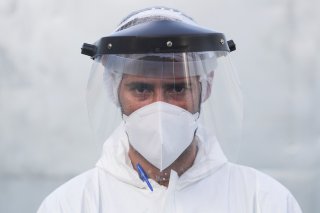by Ashton B. Carter

The incoming Biden-Harris administration brings hope that scientific expertise will once again be a cornerstone of good governance.
There are good reasons to expect that Washington will do so. As President-elect Biden said during his victory speech, “Americans have called on us to marshal…the forces of science and the forces of hope in the great battles of our time.”
We are in the midst of one such great battle now. Despite promising news on several potential vaccines, COVID-19’s trajectory of cases portends a dark pandemic winter.
At times like these, we need all hands on deck. Especially critical to our efforts will be enlisting more scientists and technologists into the policymaking process. So, let me speak directly to those engineers, coders, geneticists, and others on the front lines of innovation who may be considering public service.
Any service to the country is valuable. Should you decide that the best way for you to serve is by offering your technical skills to your local government, state capital, or to an executive branch entity like the Defense Digital Service, which I established, and its many more counterparts throughout the Executive Branch, you will be able to do a lot of good for your neighbors, your community, and your country.
But I want to make the case for a type of service you may not have previously considered: offering policy advice on science and technology issues to the United States Congress.
The need for scientific and technical expertise in Congress has never been greater. We live in an era of rapid technological progress that will shape society for generations to come. We need a Congress that is capable of keeping up with, and shaping, the emerging technologies of our time—like facial recognition, innovations to create a green energy future, and biotechnologies that will help us prevent the next pandemic.
Congress needs you. As a policy adviser, you would bring subject matter expertise and technical skills to congressional offices and committees, of course, but you would also bring something else: a different way of thinking about problems and solutions. Members of Congress have a formidable number of issues to master and make decisions about, and they need all the help they can get. The key is to assess the technical feasibility and long-term trajectory of the options before Congress, so members can combine science with other considerations they must bring to bear on decisions.
Your service to Congress would benefit you, personally and professionally, as well. Working on Capitol Hill would help you build new skills, broaden your personal and professional networks, and allow you to make significant policy contributions in the areas you care most about.
It may also set you on a path to a career of public service—as it did for me. Long before I was Secretary of Defense, I was a physicist working at MIT as a research fellow, and was asked to offer technical analysis to the Office of Technology Assessment, a now-defunct congressional support agency that offered nonpartisan expertise on science and technology issues. Doing meaningful work at the OTA convinced me that I could use my scientific training to serve the public good, and I spent much of my career doing so at the Department of Defense.
Unfortunately, years later, it is not as easy as it should be for scientists and technologists to find policy advisory roles in Congress. Some short-sighted members of Congress still fail to see the value of in-house STEM expertise, while many universities do not even inform STEM students about potential policy careers.
This week, my team at the Technology and Public Purpose Project released a report on how Congress, universities, and foundations can work together to create more and more effective pathways for STEM professionals to serve in policy advising roles. There is much that each of these groups must do to, first, make Congress a more hospitable place for scientific input; and second, to prepare scientists and technologists to be successful on Capitol Hill.
Our report argues that existing STEM-to-Congress pathways that are successful, like the renowned fellowship programs that place STEM professionals in congressional personal offices and committees, should be scaled up, potentially by new funding sources. Universities should work with their representatives in the Congress to develop district- or state-oriented pathways that include training and placement for STEM students or post-doctorates. And foundations should both support existing successes and catalyze innovative pathways and partnerships between Congress and other organizations.
You can learn more about opportunities to serve in policy advising roles in our report. The American people need a Congress that is capable of thoughtfully reckoning with emerging technologies. Congress needs your help to do that well.
No comments:
Post a Comment